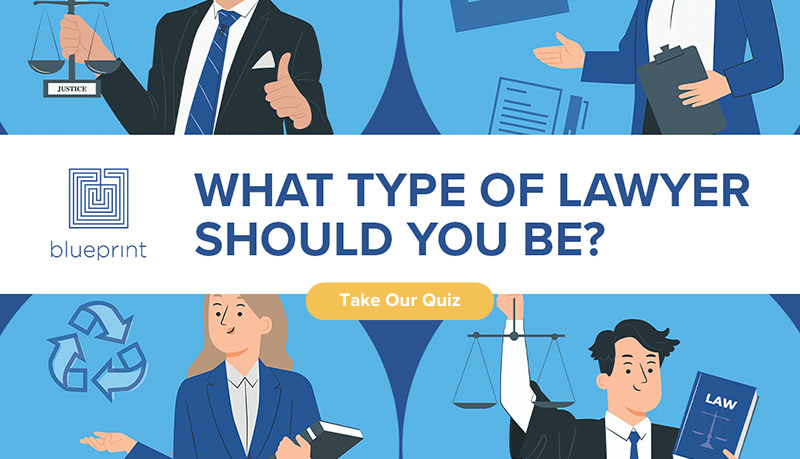If you’re a college student considering law school, or even a non-traditional applicant thinking about a career change, you’ve probably heard the term “Big Law” thrown around. But what is “Big Law”? Why does it seem to be so popular among pre-laws and law students? And is it as dramatic and exciting as “Suits” made us believe?
What is Big Law?
“Big Law” (also written as BigLaw) is a collective term that refers to America’s largest and most prestigious law firms. These firms can employ thousands of lawyers and often have multiple offices across the country or even around the world. You’ve very likely seen their buildings punctuating the skylines of downtown areas. These firms usually have a prominent presence in major cities, like New York, Los Angeles, Chicago, and Washington D.C.
Big Law firms are big (obviously). Hundreds or even thousands of attorneys can all practice at a single firm. For example, Dentons, the world’s largest firm, has over 12,000 attorneys and more than 160 offices in over 80 countries.
Thanks to their size, Big Law firms typically offer a wide range of legal services in different niches. Big Law attorneys can find themselves handling corporate transactions, high-stakes litigation, and serving clients ranging from Fortune 500 companies to international conglomerates.
Benefits and Drawbacks of Working in Big Law
High Salaries and Career Advancement
One of the major draws of Big Law is the potential for high salaries. The median starting salary for Big Law attorneys in 2023 ranged from $155,000 to $215,000. With the average law school debt hovering around $120,000, you can understand why a career in Big Law can be so attractive to future lawyers.
Further Reading
However, money is definitely not the only pro of working for these firms. Junior attorneys can get experience working on large (often high-stakes) cases with various types of clients. They also have the opportunity to work alongside some of the sharpest legal minds and meet potential career mentors.
Work-Life Balance
However, the high rewards come with trade-offs. Expect a demanding work environment with long hours, challenging cases, and tight deadlines. Junior associates, in particular, may find themselves regularly working late nights and weekends to meet the constant pressure to perform and billable hour targets.
This lifestyle can make a work-life balance nearly impossible. A survey published by the ABA Journal found that 17% of Big Law lawyers feel emotionally depleted by work. This can lead to burnout and a high turnover rate.
Remember that scene in “Suits” when it’s completely dark outside, but Louis tells Mike to get back to work? Not as far-fetched as it looked.

How To Get into Big Law
Education and Qualifications
Getting into Big Law requires a strong academic background. The most prestigious firms want the best candidates—who knew? Attending a top law school will greatly increase your chances of getting an offer. The best law schools for Big Law include Columbia Law School, Cornell Law School, and Northwestern School of Law.
And, of course, to get into a top law school, you’ll need to get a competitive LSAT score! Blueprint LSAT students increase their LSAT scores by 15 points on average to get into their dream school. Whether you want the flexibility of a Self-Paced Course or prefer to navigate the LSAT with instructors in a Live Course, we have the study method that fits your learning style.
Participation in law review and moot court can also bolster your résumé. However, landing a summer Big Law internship is also extremely important if you want to secure a full-time offer.
What if Big Law Isn’t for You?
Big Law isn’t the only path for aspiring lawyers. There are numerous other impactful practice areas, such as:
- Public Interest: Working for non-profits or government agencies to advocate for social justice.
- Environmental: Dealing with laws that affect how people and nature interact.
- Boutique Firms: Specializing in niche areas with a more focused practice.

Final Thoughts
It’s no surprise that Big Law looks so attractive to future lawyers, even those who go to law school with different aspirations. Many of these students have a “get in and get out” exit strategy where they plan to work a few years in Big Law and save money before leaving to pursue other areas and their true passions.
Is one path better than the other? Nope! It all depends on your goals and career dreams.
Big Law offers high rewards and rigorous challenges. Understanding what it entails can help you make an informed decision about your future legal career.
Curious about how to kickstart your career as a lawyer? It all starts with the LSAT and getting into law school! Whether you want to increase your LSAT score with the best LSAT prep or polish your law school application with guidance from our Law School Admissions Consultants, we’re here to help you every step of the way.
About the Author
The Blueprint LSAT Team is a collective of experienced educators and LSAT experts with over 20 years of experience in LSAT prep and law school admissions. Our goal is to make LSAT prep not only effective but also engaging, breaking down complex concepts into clear, accessible lessons. Whether it’s through innovative LSAT prep courses, personalized tutoring, or engaging online content, the Blueprint LSAT Team is committed to helping students excel and feel confident on test day. Vist our website to meet our tutors and instructors.




